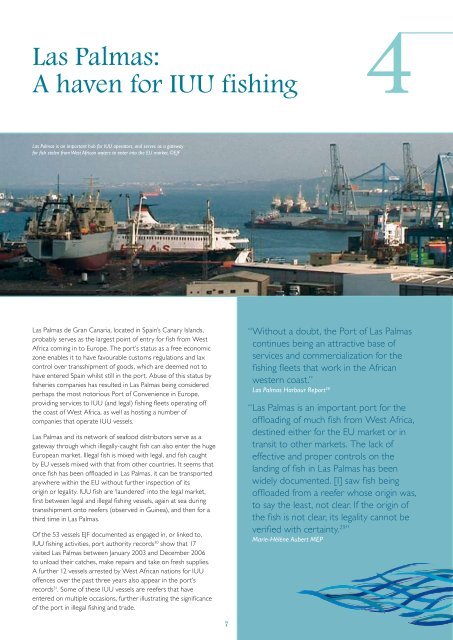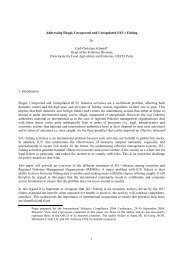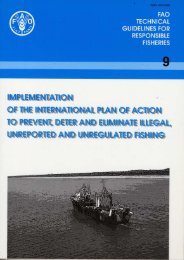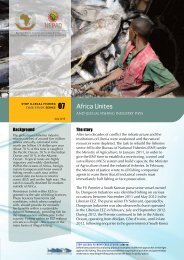Pirate Fish on Your Plate - International MCS Network
Pirate Fish on Your Plate - International MCS Network
Pirate Fish on Your Plate - International MCS Network
You also want an ePaper? Increase the reach of your titles
YUMPU automatically turns print PDFs into web optimized ePapers that Google loves.
Las Palmas:<br />
A haven for IUU fishing<br />
4<br />
Las Palmas is an important hub for IUU operators, and serves as a gateway<br />
for fish stolen from West African waters to enter into the EU market. ©EJF<br />
Las Palmas de Gran Canaria, located in Spain’s Canary Islands,<br />
probably serves as the largest point of entry for fish from West<br />
Africa coming in to Europe. The port’s status as a free ec<strong>on</strong>omic<br />
z<strong>on</strong>e enables it to have favourable customs regulati<strong>on</strong>s and lax<br />
c<strong>on</strong>trol over transshipment of goods, which are deemed not to<br />
have entered Spain whilst still in the port. Abuse of this status by<br />
fisheries companies has resulted in Las Palmas being c<strong>on</strong>sidered<br />
perhaps the most notorious Port of C<strong>on</strong>venience in Europe,<br />
providing services to IUU (and legal) fishing fleets operating off<br />
the coast of West Africa, as well as hosting a number of<br />
companies that operate IUU vessels.<br />
Las Palmas and its network of seafood distributors serve as a<br />
gateway through which illegally-caught fish can also enter the huge<br />
European market. Illegal fish is mixed with legal, and fish caught<br />
by EU vessels mixed with that from other countries. It seems that<br />
<strong>on</strong>ce fish has been offloaded in Las Palmas, it can be transported<br />
anywhere within the EU without further inspecti<strong>on</strong> of its<br />
origin or legality. IUU fish are ‘laundered’ into the legal market,<br />
first between legal and illegal fishing vessels, again at sea during<br />
transshipment <strong>on</strong>to reefers (observed in Guinea), and then for a<br />
third time in Las Palmas.<br />
Of the 53 vessels EJF documented as engaged in, or linked to,<br />
IUU fishing activities, port authority records 30 show that 17<br />
visited Las Palmas between January 2003 and December 2006<br />
to unload their catches, make repairs and take <strong>on</strong> fresh supplies.<br />
A further 12 vessels arrested by West African nati<strong>on</strong>s for IUU<br />
offences over the past three years also appear in the port’s<br />
records 31 . Some of these IUU vessels are reefers that have<br />
entered <strong>on</strong> multiple occasi<strong>on</strong>s, further illustrating the significance<br />
of the port in illegal fishing and trade.<br />
“Without a doubt, the Port of Las Palmas<br />
c<strong>on</strong>tinues being an attractive base of<br />
services and commercializati<strong>on</strong> for the<br />
fishing fleets that work in the African<br />
western coast.”<br />
Las Palmas Harbour Report 28<br />
“Las Palmas is an important port for the<br />
offloading of much fish from West Africa,<br />
destined either for the EU market or in<br />
transit to other markets. The lack of<br />
effective and proper c<strong>on</strong>trols <strong>on</strong> the<br />
landing of fish in Las Palmas has been<br />
widely documented. [I] saw fish being<br />
offloaded from a reefer whose origin was,<br />
to say the least, not clear. If the origin of<br />
the fish is not clear, its legality cannot be<br />
verified with certainty. 29 ”<br />
Marie-Hélène Aubert MEP

















